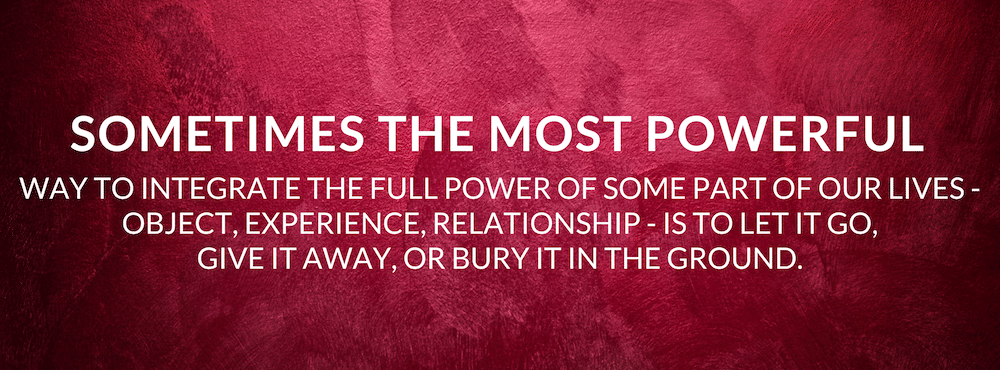My soul is scattered and buried in my most treasured places – the places where I came to know myself the most truly, deeply, fully. North Carolina, the rolling hills of Western Massachusetts, New York City, Los Angeles… and of course, India.
When I was younger, I used to gather red stones, red rose petals, red chopsticks, red toy cars, a red Swiss army knife, a big red screw, those red plastic monkeys whose arms can hang in chains on the arms of other monkeys… anything I could find that was red, I cherished and held onto.
Before I met God, these red possessions were my soul’s power.
My shaman told me to bury the red stones in the ground. She said, “Your stones will nurture the earth where you bury them. And the power they hold will grow stronger in you this way.”
She spoke, I listened.
But where to bury them? For years I had collected these red stones, cherishing each one. So when it came time to part with them, I searched the earth for the most sacred places to scatter them.
I offered them to the Godavari river – my first sacred river. I tucked some into walls in the temples there. And one, I left in the cemented roots of a Mumbai tree outside the Royal Castle Hotel where I stayed.
I laid more in the sacred caves of Pandavleni, where Buddhists have been meditating for thousands of years, tending the crevices and pools there.
I threw three stones, one at a time, into the most heavenly line of the Brahmagiri, towards my beloved Brahmins, and lightly buried a line from the jeweled pavement to Hanuman’s orange murti at the Brahmin’s abode.
This was 10 years ago, when I visited India for the first time. Being back there and revisiting the places where my soul is buried – I felt strengthened, inspired, loved.
When I returned to India last month, it was a journey of integration and reconnection. Those deep parts of me were waiting there, calling to me. Some of them are happy there – past parts of myself that no longer need my attention. Others were ready to return home in a new form, ready to be integrated into my current life, relationships, and business. India holds a deep part of my heart and always will – it reminds me who I truly am, and where I am going.
Knowing that parts of myself are in India keeps me connected that part of myself – the renunciate, the devotee, the lover of God. When I think of India, I remember myself. When I feel my own love for God, I connect with India. There’s a tie that binds me to that land – literally, emotionally, and spiritually.
Where have you left pieces of yourself behind in honor of your growth? What seeds have you planted that are ready to sprout?
What do you need to surrender now in order to expand even more? How can this act of surrender help you achieve your goals and grow your business?
Sometimes the most powerful way to integrate the full power of some part of our lives – object, experience, relationship – is to let it go, give it away, or bury it in the ground. Especially when it’s something precious or valuable. We can “plant” it in order to let it grow – even if it means we won’t “have” that thing anymore. We can let it go in order to grow and move forward.
And then see what has blossomed out of that planting, years later.
At the shrine past the wall,
There are 6 orange stones.
Someone has been having darshan there
since before Shiva, Vishnu, Brahma were named.
Encircled by the mica and geodes of the hill mountain,
I sat before these murtis
and made my offerings of my soul.
My intention? Surrender.
I brought the remaining stones with me to Jnaneshwar’s tomb in Alandi,
blessed them with his Darshan for 2 days and laid them, some against the roots of my favorite peepal tree
and the last in the banyan Tukaram wrote his abangas beneath.
My soul is returned, scattered in the ground of Mother India,
grown larger than the expanse of the planet.
I am willingly tied to the land that I love,
strengthened in connection,
deepened in love.– Jesse Johnson, Journal of Poems – India, 2009
darshan (n.) – an opportunity or occasion of seeing a holy person or the image of a deity.
murti (n.) – an image, statue or idol of a deity or person in Indian culture.
banyan (n.) – an Indian fig tree whose branches produce aerial roots that later become accessory trunks
abangas (n.) – a form of devotional poetry sung in praise of the Hindu god Vitthala

